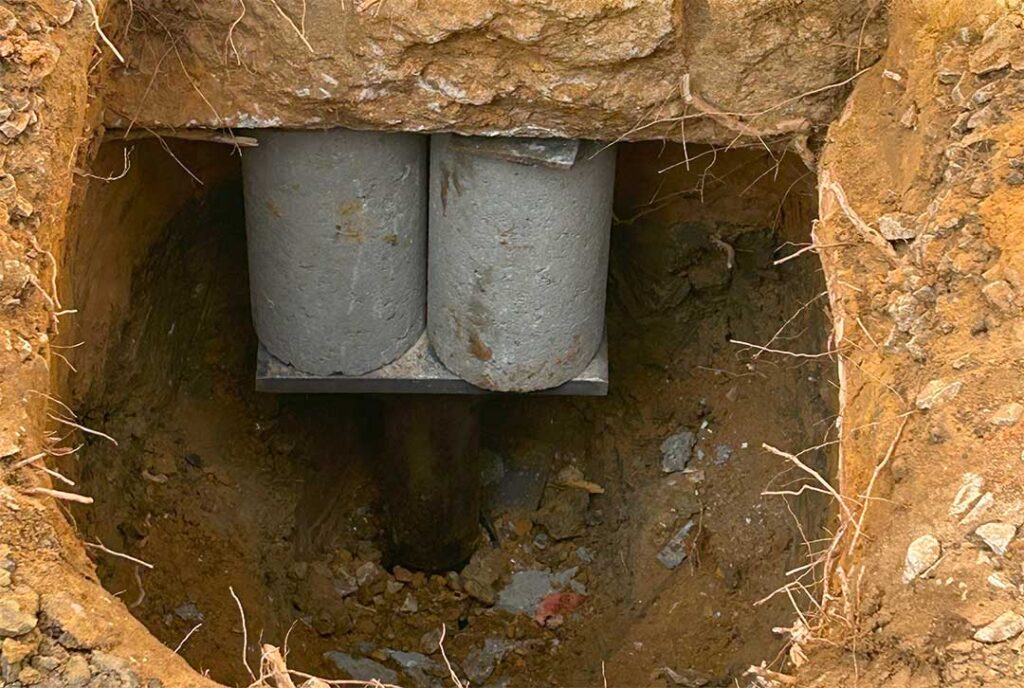service
FCS Hybrid Piling System
In Texas, addressing foundational issues is a critical task due to the state’s varying soil conditions, which can create unique challenges for the structural integrity of buildings. We recognize the importance of leveraging the most appropriate piling systems to ensure the longevity and stability of constructions. The Hybrid Piling System, a solution that integrates the strengths of various piling types, has emerged as a particularly effective method for foundation repair in the region. This system utilizes a combination of materials and techniques, offering a customized approach to meet the specific needs of Texas soils and structures.

We understand that for homeowners, the stability of their home’s foundation is paramount for peace of mind. The Hybrid Piling System addresses immediate structural needs and offers a longer-term solution to foundation problems. Its versatility and adaptability make it well-suited to the diverse terrain across Texas. By employing this system, we provide a tailored solution that improves the foundation’s longevity, ensuring better overall performance and reliability, which is crucial for homeowner satisfaction.
Key Takeaways
- The Hybrid Piling System is tailored to meet Texas’s diverse soil challenges.
- It offers a durable solution for long-term foundation stability.
- Homeowners benefit from the peace of mind provided by reliable foundation repair.
Understanding Hybrid Piling Systems
Hybrid piling systems are engineered to combine the strength of concrete and steel, ensuring stability and durability suitable for various soil conditions, particularly in regions like Texas, where soil variability poses a challenge.
Components and Construction
Hybrid pilings typically consist of steel piers combined with concrete sections, each complementing the other to improve the system’s load-bearing capabilities. The steel piers add to the strength and depth that the pilings can achieve, while the concrete sections, often reinforced with rebar or cable, contribute to the overall robustness of the structure. The construction process involves driving the steel pilings into the ground to a suitable depth before adding the concrete components.
- Materials:
- Steel piers
- Concrete with rebar or cable
- Installation:
- Drive steel piers to the required depth
- Add concrete sections for additional stability
Advantages of Hybrid Pilings
Hybrid pilings offer significant advantages over traditional concrete pilings or steel pilings alone. First, they can reach greater depths, overcoming layers of difficult soil that might hinder other systems. This results in enhanced load-bearing capacity and a more resilient foundation. Hybrid systems can adapt to different soil conditions by combining materials, making them a versatile solution for various applications, including residential and commercial properties.
- Strength: Hybrid pilings are more robust due to the combination of steel and concrete.
- Adaptability: These systems can handle varied soil types and are suitable for different structures.
- Installation: They can often be installed with minimal disruption in a short period, usually in a couple of days.
Utilizing hybrid pilings is a strategic decision for property owners in Texas, ensuring the longevity and integrity of their foundations in a state where soil conditions can pose significant challenges.
Application in Texas Soil Conditions
In Texas, diverse soil conditions necessitate robust foundation systems. The Hybrid Piling System is tailored to meet these challenges, offering superior adaptability and resistance.
Adaptability to Clay Soils
Texas is known for its expansive clay soils, which absorb water and undergo significant volume changes. These soils expand when wet and contract upon drying, leading to possible foundation movement and structural cracks. The Hybrid Piling System is designed to penetrate difficult soil conditions, including these challenging clay layers, providing reliable foundation support. The system adjusts to the soil’s plasticity, maintaining stability even as soil moisture levels change.
Resistance to Soil Shifting
Shifting soil, often due to water infiltration or ice, can undermine foundation integrity. Our Hybrid Piling System resists such shifts by combining deep penetration and sturdy construction to anchor building foundations securely. This resistance is critical in mitigating foundation damage and ensuring the structure’s longevity amidst Texas’s unpredictable soil conditions. With the Hybrid Piling System, we ensure that buildings in Texas stand on a solid base, capable of withstanding the soil’s dynamic nature.
Installation Process and Longevity
In Texas, the installation of the Hybrid Piling System combines solid engineering with a commitment to sustainability and longevity. We aim to ensure a smooth experience and durable results for your home’s foundation without heavy equipment.
Procedure of Installing Hybrid Pilings
Our installation process involves several precise steps. Initially, we hand dig holes, each about two feet square, at the predetermined piling locations. This approach allows us to address potential obstacles, such as relocating plants, and to prepare for the piling installation.
- Identify Piling Locations: Assessment of strategic points for pilings.
- Excavate: Carefully dig holes to accommodate the hybrid pilings.
- Installation: Insert the pilings, consisting of steel and concrete components. The steel provides depth, while the concrete enhances strength.
- Leveling: Adjust the home to the correct level using the installed pilings.
- Pile Cap Installation: Secure a pile cap over the pilings for stability.
- Clean Up: Restore the landscaping to its original state, reflecting our commitment to sustainability.
This procedure negates the need for intrusive heavy machinery, making the process efficient with minimal disruption to homeowners.
Ensuring Durability and Long-Term Performance
Our hybrid system is designed to deliver longevity through the combined strength of steel and concrete. The locking mechanism, often involving a cable, unites the benefits of both materials, ensuring lasting stability for the foundation.
- Materials: Utilize steel for depth penetration and concrete for endurance.
- Locking Mechanism: Apply a cable to interlock components for enhanced durability.
- Warranty: Offer a lifetime warranty on our Hybrid Piling System, underscoring our confidence in its long-term performance.
- Sustainability: Focus on sustainable practices to minimize environmental impact and ensure the lasting integrity of your home’s foundation.
With our extensive experience in installation and a forward-thinking approach to foundation repair, homeowners benefit from a reliable rebuilding process and a trustworthy foundation that withstands the test of time.
Benefits for Homeowners
Homeowners seeking foundation repairs in Texas can find significant advantages with the Hybrid Piling System. We consider cost efficiency, assured warranties, and the need for minimal maintenance as key benefits.
Cost-Efficiency and Value
We understand that the affordability of repair solutions is critical for property owners. The Hybrid Piling System represents a cost-effective choice without compromising quality. This system allows for a stronger and more reliable repair by combining the depth of steel pilings with the weight distribution properties of concrete. Homeowners benefit from:
- Lower initial costs compared to other methods
- Enhanced value for money due to the longevity of the repair
Warranty and Trust
FCS Foundation Repair offers a lifetime transferable warranty on their Hybrid Piling System installations. This not only provides homeowners with peace of mind but also boosts the integrity of the property. With this warranty in place, you are assured that:
- The repairs are dependable over the long term
- The warranty can be transferred to future owners, adding value to your property
Repair and Maintenance
Maintenance concerns are common post-repair, but our system minimizes these worries with its durability. Combining concrete and steel in the Hybrid Piling System means the foundational support suits Texas’s diverse soil types and conditions. Advantages include:
- Less frequent repairs needed over time
- Minimized occurrence of sticking windows and compromised foundation walls from shifting soil
By selecting the Hybrid Piling System, you can ensure that your foundation repair service leaves your crawl space and foundation stronger, with a steadfast repair that stands up to the challenging Texas terrain.
Additional Information
In the context of a Hybrid Piling System in Dallas, Texas, a variety of foundation solutions can be considered, each with its own set of characteristics and advantages.
Concrete Piers: These are traditional foundation elements typically used in stable soil conditions. In Dallas, where soil can be expansive due to clay content, concrete piers can be suitable if driven deep enough to reach firm soil conditions.
Concrete Cylinders: These are often part of a piling system, where smaller diameter cylinders are stacked on top of each other to transfer the load to stable soil. They can be used with other systems to form a hybrid solution.
Helical Piles: Known for their ease of installation and minimal impact on the environment, helical piles are screwed into the ground and can be ideal for areas with active soils, like those found in some parts of Dallas.
Structural Engineer: A professional who would be integral in designing a Hybrid Piling System, ensuring that the combination of different piling types is optimized for the local soil conditions and building loads.
Solid Foundation: The ultimate goal of any piling system is to provide a solid foundation that will not fail under the structural loads and environmental conditions specific to the location, such as the shifting soils of Dallas.
Foundation Repair Industry: In Dallas, this industry is well-acquainted with the challenges of repairing foundations in expansive soils, and hybrid piling systems may be a solution offered by companies in the area.
Helical Piers: These are similar to helical piles and are often used interchangeably in terms of terminology. They provide immediate load-bearing capabilities and can be quickly installed with less site impact.
Active Soils: Soils that expand and contract with moisture content can be problematic for foundations. Dallas is known for having such soils, which necessitates using foundation systems that can adapt to these changes.
Sustainability of Concrete Piling: While concrete is a robust material, its production can have a significant environmental impact. The sustainability aspect might be improved by combining it with other materials in a hybrid system.
Steel Piles: These are often favored for their strength and ability to be driven deep into the ground, making them suitable for end-bearing applications in firm soil conditions.
Larger Diameter Concrete Cylinder: This can distribute loads over a larger area and is particularly useful in softer soils where a broader base is required for stability.
Expansive Soils: Soils that swell when wet and shrink upon drying, causing movement that can damage foundations. Dallas has areas with expansive soils, which can challenge foundation stability.
Firm Soil Conditions: The target for the end of a piling system is to ensure that the foundation will not shift or settle significantly over time.
Piling Location: The specific placement of piles is critical to the success of a foundation system, especially in a hybrid approach where different types of piles may be used in different areas based on soil conditions.
Cost Savings: Hybrid systems can offer cost savings by combining the most effective and economical solutions, such as using helical piles where they are most advantageous and concrete where it is most effective.
Foundation Installation: The process of installing a foundation system, which, in the case of a hybrid system in Dallas, would need to account for the local soil conditions and the specific engineering requirements.
Helical Pile Foundations: These can provide a quick and stable foundation option, particularly in areas with problematic soils, as they can be installed with minimal vibration and no need for curing time.
In Dallas, Texas, a Hybrid Piling System might combine the deep penetration of concrete piers with the speed and minimal disturbance of helical piles to address the challenges of expansive soils, ensuring a solid foundation for structures in this region. A structural engineer would be essential in determining the appropriate combination of piling types and installation techniques to achieve both cost savings and long-term stability.
Frequently Asked Questions
In this section, we answer some of the most common inquiries regarding hybrid piling systems in Texas, touching on cost factors, soil considerations, benefits, installation differences, and typical repair costs.
